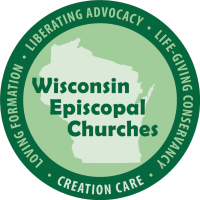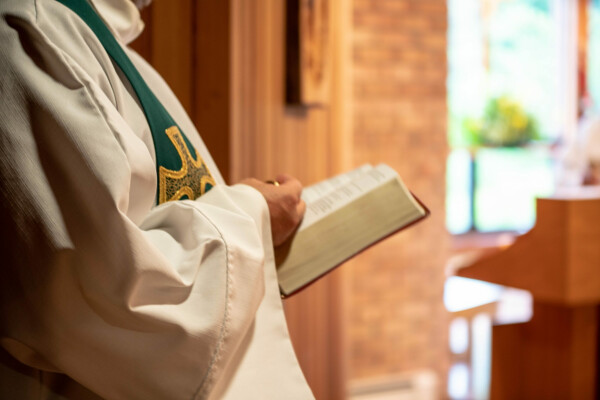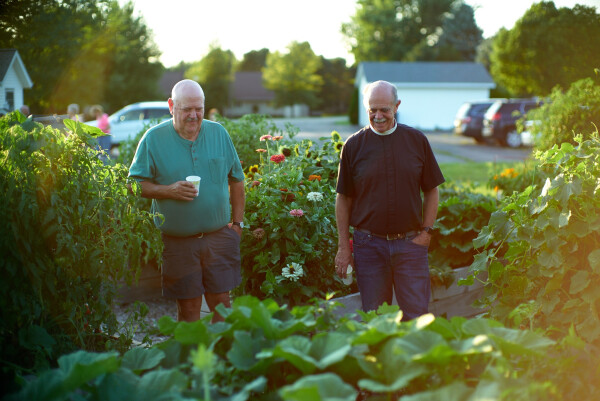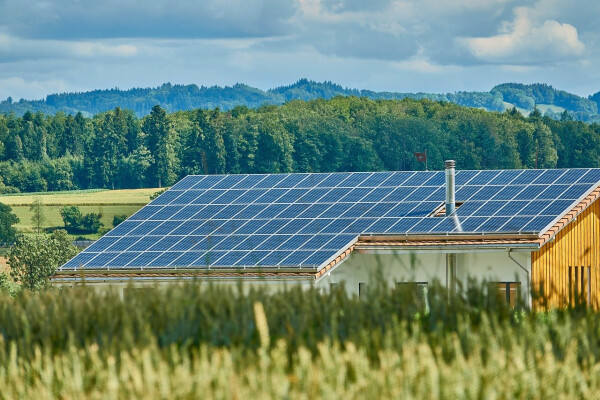Creation Care

Commission on Creation Care
Created October 2021
Our purpose is to engage Episcopal parishes in the Episcopal Diocese of Milwaukee to live sustainably as God commissioned us. All faith communities are welcome to participate.
Statement of Beliefs: Earth and all life are God’s great gift. We have not been good stewards. Time is short. We must do our part in restoring God’s gift in a way that does not result in injustice to the vulnerable. We believe in the interdependent web of God’s creation.
Projects and Actions
We will carry out our mission by:
- Worship: Gathering resources that congregations may draw on for homilies, liturgy, and Christian formation.
- Education: Educating ourselves and our congregations about the global environmental crisis.
- Organizing study groups on the Biblical foundations of Creation Care.
- Organizing Creation Committees.
- Buildings and Grounds: Working toward alternative energy sources; cleaning water and air, using non-toxic cleaning supplies; and creating habitats for pollinators and our non-human neighbors.
- Advocacy: Networking at the local, regional, and national level with related organizations.
- Accountability: Setting goals and measuring the results of our efforts including our investments.
The Commission was created by resolution at the October 2021 Annual Convention of the Episcopal Diocese of Milwaukee. Our focus is on the relationship between God and all of creation, of which we are but one small part. While we honor the science and what it is teaching us, our focus is on our faithfulness to the Father, the Son, and the Holy Spirit.
Grants Available Now
Applications are due on or before March 31, 2024.
Ten grants from the Commission on Creation Care are available for up to $1,000 per congregation. The proposals must support our mission to engage parishes in the Episcopal Diocese of Milwaukee to live sustainably as God commissioned us. The priority for this year’s grants are energy audits/surveys through Focus on Energy and following the recommendations to reduce your carbon footprint.
Click here to learn more and to apply.
Our work is divided into three different categories following The Episcopal Church's format:
- Loving Formation,
- Liberating Advocacy, and
- Life-giving Conservation
Below you will find resources and links organized using this format. For more information or to join us email .
Liberating Formation
For God’s sake, we will grow our love for the Earth and all of life through preaching, teaching, storytelling, and prayer.
Jesus, God so loved the whole world. We follow Jesus, so we love the world God loves. Concerned for the global climate emergency, drawing on diverse approaches for our diverse contexts, we commit to form and restore loving, liberating, life-giving relationships with all of Creation.
Worship
Book of Occasional Services 2018
- Liturgical Materials for Honoring God in Creation, Book of Occasional Services 2018, pgs. 289-307
- A Litany for the Planet, Book of Occasional Services 2018, pgs. 302-307
Litany for Healing the Earth
Creation-Focused Worship Resources, Diocese of Massachusetts
Season of Creation: A Celebration Guide for Episcopal Parishes 2023
Prayer
Prayers of the People 1, Deacon Gregg Schneider
Prayers of the People 2, Deacon Gregg Schneider
Creation Sunday Prayers
Environmentally Responsive Lord’s Prayer, Church of England
Theology
To create a common understanding of how our tasks are linked to our beliefs, we engaged the Center for Religion and Environment to ground us in our faith and theology. Links to the presentations from Collin Cornell appear below.
Deep Green Leadership, Fr. Jerry Cappel
Creation Theology, Matthew Fox
Real Presence, Richard Rohr
Study: For Adults
Wisconsin Initiative on Climate Change Impacts
Caring for Creation from the Evangelical Lutheran Church in America
Faithful Resilience
Multi-Faith Environmental Curriculum from Faith in Place
Faith & Science Curriculum from the Evangelical Lutheran Church in America
Educational Resources for All Ages from Creation Justice Ministries
Our Grandchildren’s Water curriculum developed by Faith in Place
Faith in Place Resources and Curriculum (Just Eating Curriculum, Multifaith Water Curriculum, Migration and Me Toolkit, Waste Toolkit, CSA Toolkit, Composting 101 Guide, Pollinator Garden Guide, Vegetable Garden Guide and more)
The "Ethics of Belonging" of Indigenous Traditions with Yuria Celidwen
The N.R.S.V. Coffee Hour Cookbook
Study: For Youth
Climate Justice Curriculum for Youth and Young Adults These lesson plans are written by experienced church teachers using practical approaches to respond to the needs of volunteer teachers. They are designed to follow the Revised Common Lectionary and published by The Episcopal Church.
Season of Creation and Earth Day Resources
Weathering the Storm
Season of Creation
Reading Suggestions
1. Saving Us: A Climate Scientist's Case for Hope and Healing in a Divided World by Katharine Hayhoe
2. Drawdown: The Most Comprehensive Plan Ever Proposed to Reverse Global Warming edited by Paul Hawken
3. Seven Simple Steps to Green Your Church by Rebekah Simon-Peter
4. Sustainable World Sourcebook: Critical Issues, Viable Solutions, Resources for Action
5. The Intersectional Environmentalist: How to Dismantle Systems of Oppression to Protect People + Planet by Leah Thomas
Liberating Advocacy
For God’s sake, standing alongside marginalized, vulnerable peoples, we will advocate and act to repair Creation and seek the liberation and flourishing of all people.
Becoming An Advocate
Advocacy Tools for Loving Your Neighbor: From the Evangelical Lutheran Church in America: "To advocate is to do the work of the spirit of God, which is nothing less than the work of love. Advocacy is the practical work of love, seeking justice, working compassion, living humbly, advocating for equality, and human dignity for all, who have been created in the image and likeness of God."
How It Works: Becoming a Creation Justice Church in Five Steps The United Church of Christ’s Creation Justice Church program assists congregations in making the ministry of environmental justice an integral strand in the DNA of their faith community. A congregation can be designated as a Creation Justice Church by taking these five steps.
Religious Ministries
Episcopal Public Policy Network: As we are called by God to care for creation, The Episcopal Church supports policies that protect the natural resources that sustain all life on Earth. The Church calls for policies that reduce greenhouse gas emissions, promote sustainable energy, encourage the safe and just use of natural resources, and support communities impacted by a lack of environmental stewardship and environmental racism.
United Church of Christ Environmental Justice Ministries
Creation Justice Ministries: Creation Justice Ministries (formerly the National Council of Churches Eco-Justice Program) represents the creation care and environmental justice policies of major Christian denominations throughout the United States. We work in cooperation with 38 national faith bodies including Protestant denominations and Orthodox communions as well as regional faith groups, and congregants to protect and restore God's Creation.
The RENEWAL Project and the Religious-Environmental Movement The RENEWAL Project has been designed to make the documentary and its inspiring stories available to people and organizations who want to be a part of this growing movement to protect life on our planet and reverse the damage that humans have done to the environment.
Faith in Place Environmental Advocacy: Communities across the world are facing the devastating impacts of climate change and environmental pollution. At Fatih in Place, we work with communities to educate and empower them to take action on environmental crises. We also recognize the disproportionate burden these crises have on historically disadvantaged communities and communities of color and work to ensure justice is centered in the solutions we support. Learn about the history of environmental racism, the policies we support, and ways to take action below.
Justice Organizations
5 Ways To Engage In Environmental Justice: Anthony Karefa Rogers-Wright gives an instructive discourse on why environmental justice is so critical to progress.
Citizen's Climate Lobby: Citizens’ Climate Lobby (CCL) is a nonprofit, nonpartisan, grassroots advocacy climate change organization focused on national policies to address the national and global climate crisis.
Life-Giving Conservation
For God’s sake, we will adopt practical ways of reducing our climate impact and living more humbly and gently on Earth as individuals, households, congregations, institutions, and dioceses.
Reduce Your Church’s Carbon Footprint
- Gather 12 to 24 months of gas and electric utility bills and put in a spreadsheet to analyze your energy cost and use (an in-house Energy Audit).
- Find out where the problems are.
- Your maintenance person can help here,
- Make a list of equipment that needs to be replaced today or soon,
- Educate yourselves: do research in the areas you have problems.
- Watch the Commission on Creation Care video: How to Decarbonize your Facility: A roadmap and guide to reduce the carbon footprint and save money. Click here or on the image below to watch the video.
- Plan your strategies with your building and grounds committee or and energy consultant.
- Changing to LED lighting is an easy place to begin and saved money for years, but it is best to bundle several items together for a larger project,
- Reducing air leaks in your building envelope is a high priority and helps with comfort,
- Next, look at HVAC and alternative energy options that fit your situation.
Other Ways to get started:
52 Ways to Care for Creation—One step each week of the year.
10 Tips for Your Green Team from Faith in Place
Carbon Footprint Estimators
Carbon Tracker: Thanks to the Episcopal Diocese of California, our whole church has a new tool to support anyone who wants to make more life-giving choices about how we inhabit the earth. The Carbon Tracker is a web-based application that helps individuals, households, congregations, and even dioceses to measure your carbon footprint and take steps to shrink it to fit a sustainable life.
Cool Climate Calculator: A carbon footprint estimator, to figure out how much greenhouse gas you are emitting and how to cut down.
Church Property: Buildings
Focus on Energy
Net Zero Toolkit (Scottish Episcopal Church)
Five Steps to Becoming a Cool Congregation
Church Property: Grounds
Good News Garden: The mission of the Good News Gardens movement, as led by The Episcopal Church, is to partner with people in transformational agrarian ministry that feeds body, mind, and spirit. Good News Gardens is a church-wide movement of individuals, congregations, schools, colleges, seminaries, monasteries, camps and conference centers involved in a variety of food and creation care ministries – gardening, farming, beekeeping, composting, gleaning, feeding, food justice advocacy. The list goes on and on. Collectively Good News Gardens share their abundance, their prayers, and the Way of Love in their communities and beyond.
Personal Responsibility
Greening Your Personal Life and Environment
Conserve Energy Future
Install Renewable Energy at Your House of Worship from Faith in Place
Refuse Single Use Plastic
Insulating and Weatherizing Your Home
Alternative Energy Resources and Funding Sources
- Midwest Renewable Energy Association: Promoting clean energy, energy efficiency, and sustainable living through education and demonstration since 1990.
- RENEW Wisconsin: RENEW Wisconsin’s Solar for Good initiative fosters the expansion of solar power among mission-based nonprofits and houses of worship in Wisconsin.
- Couillard Solar Foundation: We have one mission: to help Wisconsin nonprofits get solar for their organizations. Nonprofit organizations all over Wisconsin are looking for ways to take part in the renewable energy revolution happening right now. The Couillard Solar Foundation (CSF) was created to help them do just that.
- Power Purchase Agreement: A solar power purchase agreement (PPA) is a financial agreement where a developer arranges for the design, permitting, financing and installation of a solar energy system on a customer’s property at little to no cost. The developer sells the power generated to the host customer at a fixed rate that is typically lower than the local utility’s retail rate.
- Legacy Solar Co-op: Legacy Solar Co-op is a Wisconsin-based, member-owned cooperative providing solar and energy efficiency products and services. Our goal is to bring people together to support local and statewide solar and other clean energy initiatives.
- Federal Funding for Energy Work at Houses of Worship from The Nature Conservancy
- Episcopal Renewable Energy Non-profit (EREN)
- Federal Funding Resources for Nonprofits and Houses of Worship Briefing presented by Interfaith Power and Light
Educational Videos
Geothermal 101: Making a Zero-Carbon Energy Future a Reality from Clean Energy for America
A Natural Solution to Climate Change What we do between now and 2030 will determine whether we can slow warming enough to avoid climate change’s worst impacts. We must drastically cut emissions and remove some carbon from the atmosphere. Fortunately, plants naturally absorb and store carbon. By protecting natural habitats and carefully managing farmland and forests, we can store billions of tons of this “living carbon.”
Decarbonizing Your Church by James Liedel. Created for the Commission on Creation Care
The Letter: A Message to the Earth In 2015, Pope Francis wrote The Letter, an encyclical on the environmental crisis. Pope Francis and climate activists around the world share the same concern.



